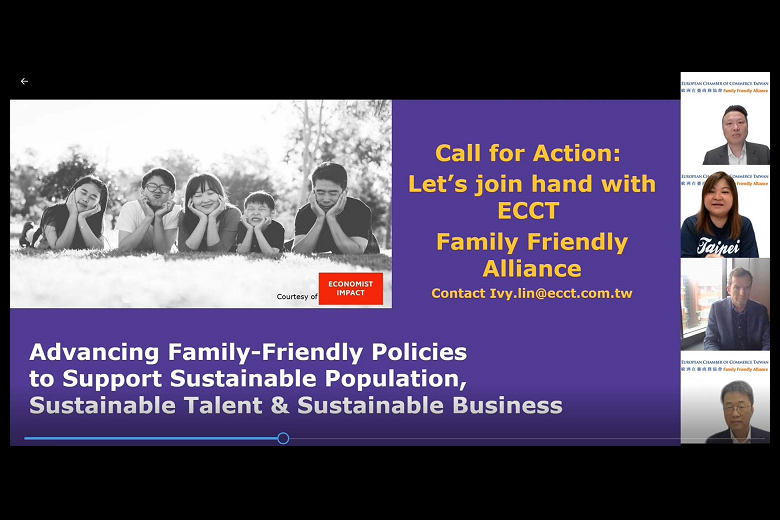FFA webinar on talent & population sustainability

The ECCT’s Family Friendly Alliance (FFA) arranged webinar on the topic "Talent and Population Sustainability - Family friendly workplace for Talent attraction and retention" (人口與人才雙永續:友善家庭職場如何磁吸人才). It was the first in a series of webinars held for the purpose of discussing the latest trends and sharing best practices aimed at creating a family friendly environment in Taiwan.
In the webinar, guest panellists Boonhuey EE, General Manager of Merck Healthcare, Merck Ltd. and Spencer Chang, Outsourcing Director of Adecco Taiwan, shared some of the best practices of leading multinational enterprises to make their working policies and workplaces flexible and friendly to help young parents with child rearing. The webinar began with opening remarks by ECCT CEO Freddie Höglund, which was followed by a short introduction to the topic by Boonhuey EE. The rest of the webinar was devoted to a panel discussion moderated by Howard Shiu, Partner at Baker McKenzie & Co-Chair of the ECCT's Human Resources committee.
In her opening presentation, Boonhuey EE gave an overview of the demographic challenges facing Taiwan (and other developed countries) and an introduction to the FFA. She stressed the importance of forming public private partnerships. She noted that the government had already begun to take action to address the problem of Taiwan’s low birth rate by initiatives such as expanding the scope of IVF subsidies for couples by up to six IVF treatments. However, there is no silver bullet or single solution to addressing the issue. Multiple actions on multiple fronts are needed and even small steps count. She stressed that understanding the needs of employees at various stages of lives and careers is important before employers can help them. More than 10 companies have joined the FFA focusing on sharing knowledge and best practices, and drafting policies and putting together toolkits that will make a difference.
As for her own company, there is a strong focus on improving diversity and inclusion. In terms of concrete actions, the Merck group offers 84 days of maternity leave (above Taiwan’s mandatory 56 days), as well as 10 days of paternity leave, IVF subsidies as well as two days of leave for IVF treatment, among others.
On the subject of talent sustainability and the lack of talent or brain-drain in Taiwan, Spencer Chang said that the talent shortage is a global issue that is being influenced by many factors. Citing recent research, he said that at least 62% of companies are facing issues of talent shortages and filling vacant posts can take six months or longer. This is putting added strain on other colleagues (who have to take on extra workloads to make up for staff shortages). There are also still lingering impacts from the pandemic. On the positive side, flexible working options are now standard at most multinational companies, although remote working can also result in overwork if there are no rules and safeguards in place to prevent it.
Boonhuey EE said that while progress had been made, more knowledge, awareness and experience sharing was still needed. For example, there is a tendency to conflate flexible working arrangements with remote working, although it is not the same thing. Flexible working arrangements could involve remote work but it also includes flexitime and similar working schedule rearrangements. Even though 80% of companies in Taiwan are SMEs, many of which may not be able to allow employees to work from home, they can nevertheless be encouraged to give employees flexibility to arrange their working schedules to enable them to be able to take care of children. Moreover, some working functions, such as factory or laboratory work, cannot be done remotely. People in these roles would also benefit from more flexibility.
On the subject of implementing a family friendly workplace, Spencer Chang noted that many companies were not prepared for the pandemic but those that had set up remote, cloud based systems were much better prepared to deal with the disruptions that resulted. Companies should not scramble to do everything at once and admit that they don’t have all the answers. Also, they shouldn’t try to do everything by themselves. Instead, they should join alliances like the FFA to collaborate and find the best way forward.
Boohhuey EE said that companies should look into their own company policies to see if there are any gaps and introduce policies to address the gaps. For example, Merck noticed that most policies only focused on the post-birth stage but there is often no support for the pre-birth stage. It is important that managers have the right mindset and commitment to create a friendly environment for employees. Managers need to understand that their workplace policies need to support employees' work life balance and include the flexibility to enable that. She noted that all managers at Merck have to go through inclusive leadership training. For roles where employees need to be in the office or the lab, employers should consult with employees to ask them what kind of flexibility they want. She added that flexibility is needed not just for raising children but for taking care of ageing parents.
Spencer Chang reiterated the importance of training senior and middle managers. He added that it is important for managers to lead by example. For example, if managers are always in the office after regular hours, it sets the example that employees are expected to follow. Conversely, if they keep regular hours (as far as possible), it sets the tone for other staffers. Moreover, having more rest is also likely to make them more productive. It is also important to consult with employees to discover their real needs. Simply copying the policies of competitors may not work for any given company. Managers need to trust and empower subordinates to do their jobs and judge them on their performance rather than by the amount of time they spend in the office.
